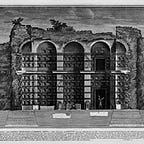Thoughts Thought Digest 2
For me, writing is the most productive when the thesis of an essay is occupying my thoughts each day, and it feels like the resultant writing is an expulsion of an intellectual buildup. But, when I look at some of the writing in retrospect, it’s not obvious what was so pressing. For instance: at the time of writing this, I’ve been working at an essay for about a month now, and finally — finally! — finished it. It has taken dozens upon dozens of hours. And yet I know that, upon its publication, it won’t be ready by very many people. What possessed me? Well, something did. And it will again, in time.
Notice that when people say, “There are legitimate criticisms to be made of [x], but 99.9% of the people making the criticisms are wrong/stupid/malicious”, the chance to mention which criticisms are legitimate is neatly bypassed. It’s a pretty brilliant rhetorical tactic — and one I’ve used on occasion myself! The first part of this rhetorical structure offers pretensions of awareness and open-mindedness, while the other part casts the vast majority as so wrong that any contention is, effectively, totally wrong. At that point, you have effectively preemptively shielded the thing from the very thing you claim to be open to.
The cultural framing of Left vs. Right has made it near-impossible to talk about the capital riot in almost any capacity outside of sentiments about “assaults upon democracy.” In this sense, it was a gift to the exceptionalist complex of the US political mechanism. Think about how effectively certain ideas and actions impelling events can, depending on how [a] or [b] is associated with a contingent or adjacent thought, be made off-limits, reprehensible, laughable. Think about how to ask what, precisely, was vile about the capital riot will invite accusations of political sympathy which avoid answering the question. When a response is automatic, it further automates the aforementioned political mechanism. It becomes sentimentality. Was the worst thing about the capital riot its violence? Was it the violence in conjunction with the political aim? Was it the identities of the people involved? Why is it spoken of in ways not so different from those regarding 9/11? What is the form of permissible revolution? All of these questions are excluded by the aforementioned cultural framing. All that we have to know is that a bunch of Trump supporters violently assembled, and that poor America, that perfect example of perfect democracy, had to suffer being bullied for a day.
It is very strange to see, among the responses to the Russian and Ukrainian war, an almost perverse eagerness to identify this as, “finally”, the inception of World War 3 — almost as if there is a desire to actualize a decades-long dread simply to get it over with. This sentiment is mostly coming from people who were born during the last thirty years and who do not live in the involved areas. So, it is a sort of negative fantasy; but it also speaks to the psychic potency of The Bomb whose absence perpetually implies its imminence.
The negative criticism of something as “materialist” is useful to identify primarily the belief that reality consists only of that which our technology can detect. What is problematic is that materialists themselves have no coherent definition for materiality.
The great irony of historian Dan-el Padilla Peralta’s project, as detailed in a New York Time article, is that it perpetuates the Eurocentric/Rationalist ideology it purports to destruct and override — for it believes that the mythologies arising from canons can be consciously controlled. Peralta and others who think like him do not understand that peoples will always find whatever aesthetic archaisms they can to supplement their pathologies. Mythology is not an itemized flowchart whose potential effects can be rationally obstructed via de-problematizing. This is a tricky sort of observation to make: on the surface, it sounds resigned to inaction and critical abstention. But decrying White Supremacy is not the same as attempting to construct a purified canon. Mythology will always defeat intellectualism.
Claiming that private property is theft is incoherent. The description of something as theft is contingent upon there being an original ownership/occupancy anyway; so the idea depends on that which it rages against. As far as I can tell, this claim most often comes up as a sort of rallying cry against landlords and anyone who could have feelings about stuff being stolen. The one is fine but does not implicate privacy or ownership per se; the other is getting into blatantly sociopathic behavior.
It’s never not been weird to me how often people state that they “still have to get through” this or that show or videogame or book series, as if engaging media were a kind of consumptive job. Maybe this is just what happens when multimedia is glutted to an extreme. If anyone is engaging media with an overt awareness of some sort of Queue of Content they “have to get through” — like a good and proper Consumer — , in my opinion, it’s time to reevaluate methods of discrimination and modes of engagement.
